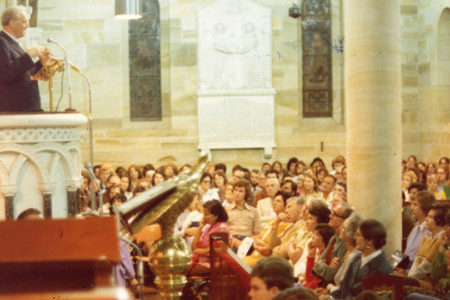Making God Known
If you were to ask people to define the term missionary, they probably would tell you it means someone who goes to a faraway land to teach about Jesus. And they’d be right. After His resurrection, Jesus said, “Go into all the world and preach the gospel to every creature” (Mk. 16:15). And godly men and women the world over have given their lives to carry out that Great Commission.
But missions did not begin with Jesus. The concept of making God known—telling people the good news that an almighty God in heaven loves them and can forgive their sin—comes from the Hebrew Scriptures. In fact, God first intended His missionaries to be the Israelites.
Israel’s Dark Lighthouse
God intentionally created the nation of Israel from the patriarchs Abraham, Isaac, and Jacob. He told Abraham, “In your seed all the nations of the earth shall be blessed” (Gen. 22:18; 26:4). That promise (as well as the bequest of the land) passed to Jacob (28:13–14), the father of the 12 tribes of Israel whom God created for a purpose that would bless all mankind.
What did Israel have that would be a blessing? Knowledge of the true and living God. Israel was to make Him known to the rest of the world by worshiping Him only and living for Him so that the Gentile nations would be able to come to know Him. That was Israel’s missionary call.
King Solomon articulated the call when he dedicated the nation’s first Temple, which stood in Jerusalem for 373 years (959 B.C.–586 B.C.). He asked God to “maintain the cause of His servant and the cause of His people Israel,…that all the peoples of the earth may know that the Lᴏʀᴅ is God; there is no other” (1 Ki. 8:59–60).
Israel was to be like a lighthouse, dispelling the bright beacon of spiritual truth to all the surrounding nations. The message was simple: Come to the Lord God of Israel and find rest for your soul. Israel was to be salt and light to a lost and spiritually dead Gentile world.
Unfortunately, apart from a few brief moments, the Israelites did not draw their neighbors to almighty God; the heathens infected the Israelites, drawing them to pagan deities. “So,” declared God, “I scattered them among the nations [Gentiles], and they were dispersed throughout the countries;…When they came to the nations, wherever they went, they profaned My holy name….But I had concern for My holy name” (Ezek. 36:19–21).
Eventually the situation so deteriorated that God sent judgment:
And the Lᴏʀᴅ God of their fathers sent warnings to them by His messengers, rising up early and sending them, because He had compassion on His people and on His dwelling place. But they mocked the messengers of God, despised His words, and scoffed at His prophets, until the wrath of the Lᴏʀᴅ arose against His people, till there was no remedy. Therefore He brought against them the king of the Chaldeans (2 Chr. 36:15–17).
Just as most of them failed to accept the prophets, so, too, most failed to accept their Messiah. Jesus lamented,
O Jerusalem, Jerusalem, the one who kills the prophets and stones those who are sent to her! How often I wanted to gather your children together, as a hen gathers her chicks under her wings, but you were not willing! See! Your house is left to you desolate; for I say to you, you shall see Me no more till you say, “Blessed is He who comes in the name of the Lᴏʀᴅ!” (Mt. 23:37–39).
The Church’s Failures
It’s easy for Christians today to point a finger at the Jewish people and discuss Israel’s failures. But it is not as though the church were doing much better. When you consider all the church’s benefits compared to Israel’s, the church’s failures appear far greater.
The 21st-century Western church has the complete canon of Scripture, the indwelling Holy Spirit, publishing houses that make Bibles readily available at reasonable prices, Christian radio, Christian colleges and seminaries, and even Christian television.
Yet Islam is the fastest-growing religion in the world. In 2008 the Vatican said there are now even more Muslims than Roman Catholics. “The Muslims have overtaken us,” a Vatican spokesman said.1 British newspapers say that by 2035, there will be more practicing Muslims than Christians in Britain.2
And in 2003 Rob Phillips of the Baptist Press filed an article titled “U.S. Cities: More Muslims Than Christians by 2020.” Wrote Phillips: “Islam is rising in America, not because of its strength, but because of the retreat of the church.”3 The article said, “80-85 percent of all U.S. Muslims consider themselves former Christians. If present trends continue, every major U.S. city will be predominantly Muslim by 2020.”4
Jesus told His church, “Go therefore and make disciples of all the nations” (Mt. 28:19). By these statistics, how well is the church really doing?With all its advantages, it hardly seems to be doing better than ancient Israel.
God has made His heart clear: He “so loved the world that He gave His only begotten Son, that whoever believes in Him should not perish but have everlasting life” (Jn. 3:16). The Israelites were called to make God known by being a lighthouse. Today the church is called to spread the word of salvation through Jesus the Messiah by going into all the world. Someday Israel will again be a lighthouse, with Messiah Jesus sitting on His throne in Jerusalem where He will reign for a thousand years. The Jewish people “shall be named the priests of the LORD, they shall call you the servants of our God” (Isa. 61:6). And they will be back in the missionary business.
ENDNOTES
- “Muslims More Numerous Than Catholics,” Reuters, March 30, 2008 <uk.reuters.com/article/idUKL3068682420080330>.
- Ben Clerkin, “More practising Muslims than Christians in Britain by 2035,” The Daily Mail, May 8, 2008 <dailymail.co.uk/news/article-564722/More-practising-Muslims-Christians-Britain-2035.html>.
- Rob Phillips, “U.S. Cities: More Muslims Than Christians by 2020,” Florida Baptist Witness, September 3, 2003 <gofbw.com/news.asp?ID=1401>.
- Ibid.







